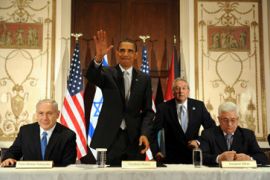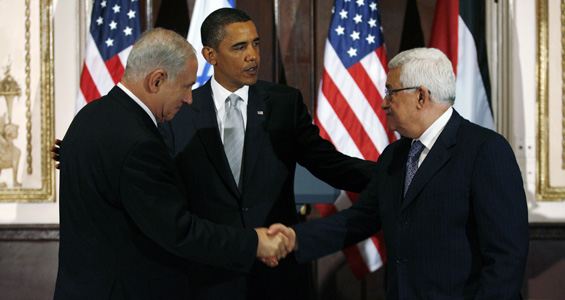Wanted: Middle East statesmen
Israeli writer says Netanyahu and Abbas must discard their ideological straightjackets.

 |
| Can Binyamin Netanyahu, the Israeli prime minister, and Mahmoud Abbas, the Palestinian president, make the transition from politicians to statesmen? [GALLO/GETTY] |
As last week’s trilateral meeting in New York showed, forces outside the control of the offices of Binyamin Netanyahu, the Israeli prime minister, and Mahmoud Abbas, the Palestinian president, have pulled these leaders back into the peace camp.
This brought to mind a quote by the Roman statesman Seneca who once wrote: “The fates lead him who will; him who won’t they drag.”
So, what is next for the peace process? One word: Leadership.
The historian J. Rufus Fears once noted that great leaders – from Pericles to Lincoln to Churchill – share four characteristics. They are anchored in principles, guided by a moral compass, posses a vision, and have the ability to build a consensus to achieve their vision.
These are the qualities that distinguish them as statesmen, rather than mere politicians.
Shattering national myths
If Netanyahu and Abbas are sincere about bringing the century-old Israeli-Palestinian conflict to an end, they must stop being politicians and start being statesmen.
 |
| The leaders must abandon pre-conditions such as those related to settlements [EPA] |
Now that the preliminary talks have passed, there are two pressing concerns on the table: The first, in the words of Rahm Emanuel, Barack Obama’s chief of staff, is to “put aside the negotiations about the negotiations and begin their negotiations”.
The second is to carry the message to the people. Peace is too arduous a task to be done without the will of the people. Both Netanyahu and Abbas will need to walk a tight rope between inspiration and honesty.
The good news is that recent polls indicate that the majority of Israelis and Palestinians are in favour of the two-state solution.
The challenge before each leader therefore is to convey the message that real peace demands meaningful compromise. Political and national myths – such as the right of return and an undivided Jerusalem – will have to be shattered.
Ideological straightjackets
The Herculean task that both leaders are facing is, to some degree, of their own making.
| in depth | |||||||||||||
|
Their inflexible pre-conditions to negotiation and to a final status agreement have made it very difficult for them to move forward without appearing weak.
Abbas’ claim that there will be no negotiation until all settlement activity is stopped, and Netanyahu’s position on an “undivided” Jerusalem and the Jewish identity of Israel may be textbook examples of strong opening positions.
But consequently both leaders will now have to marshal Houdini-like skills in order to remove those ideological straightjackets.
That said, there is no doubt that this is an opportune time to reinvigorate the peace process.
The support of the international community (including the Arab League) headed by a strong and determined US administration; stable (and semi-popular) Palestinian and Israeli governments; improving economic and security conditions in the West Bank; a significant decline in terror attacks in Israel; all point to an historical opportunity that cannot be taken for granted.
Having committed themselves to the two-state initiative in New York, Netanyahu and Abbas must now muster all their energies to demonstrate their sincerity. The future of the region rests on their ability to transform themselves from politicians into statesmen.
While the cynic inside me says “don’t hold your breath”, the lover of peace remembers that cynicism is a luxury the region can not continue to afford.
Roi Ben-Yehuda is an Israeli writer based in the US. He is a regular contributor to Haaretz and France 24 and is currently a doctoral student at the Institute of Conflict Analysis and Resolution at George Mason University. His blog can be read here.
Al Jazeera is not responsible for the content of external websites.
The views expressed in this article are the author’s own and do not necessarily reflect Al Jazeera’s editorial policy.
